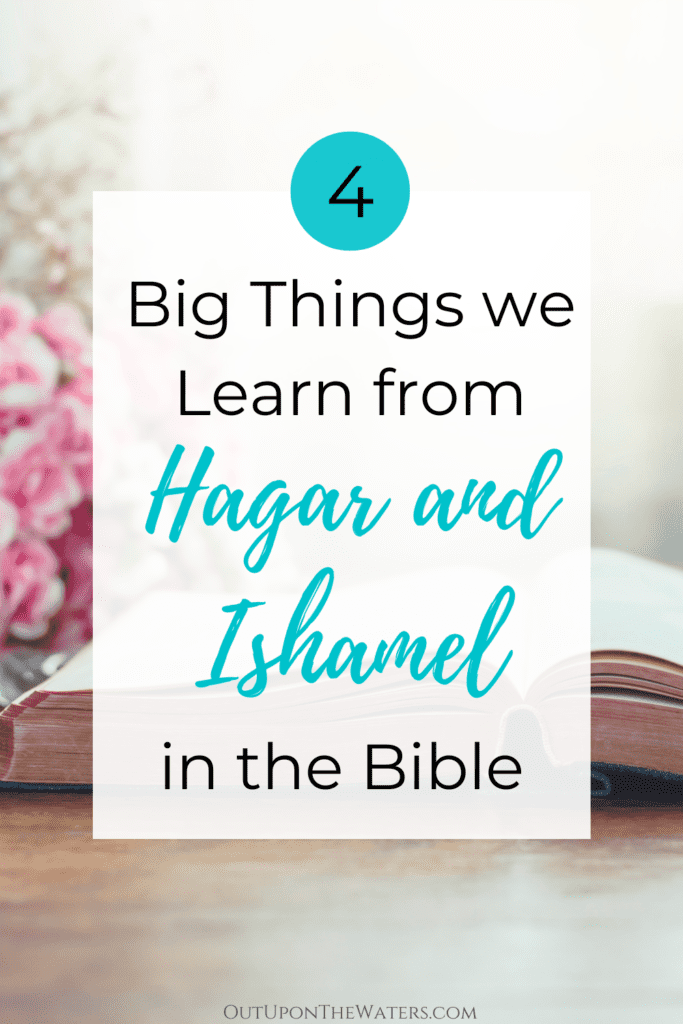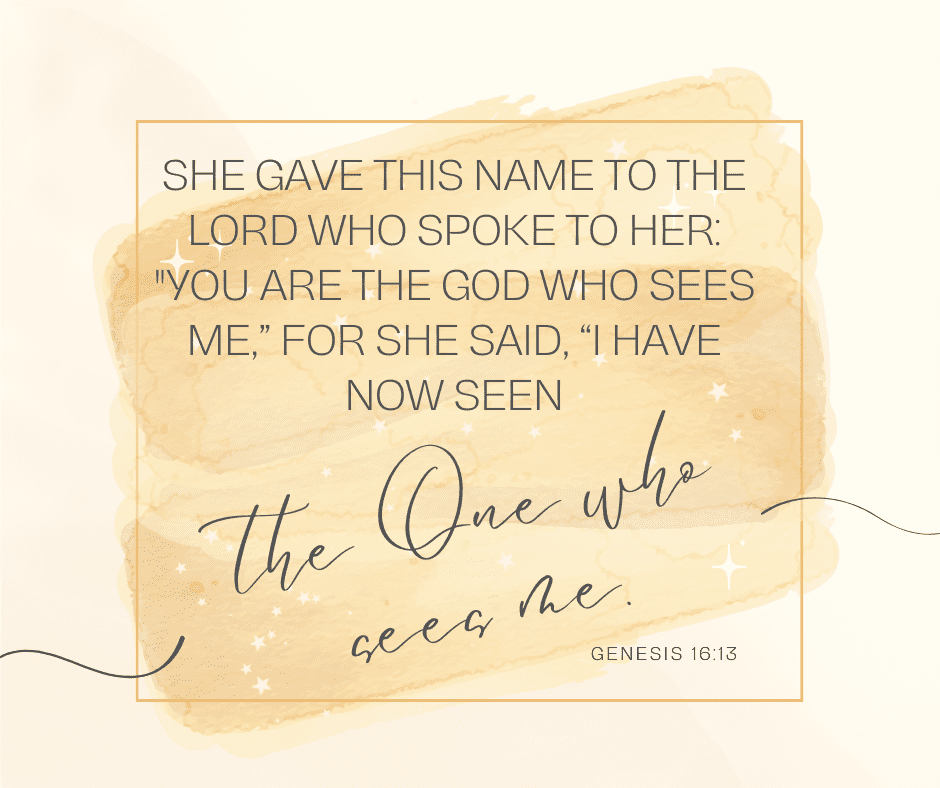The story of Hagar and Ishmael in the Bible is the story of a God who sees us in our suffering, who sees our value, who sees the details, and who sees the big picture. God knows where we come from and where we are going. Hagar recognizes this when she calls God “El Roi,” The God Who Sees Me. When we look closely at the story of Hagar and Ishmael, we can see ourselves in the character of Hagar, and we can see some comforting truths about the God who sees us too.
Lessons We Learn from Hagar and Ishmael in the Bible
The story of Hagar and Ishmael in the Bible begins with God’s promise to Abraham: that he will be blessed with many descendants. Sarah, however, is well past childbearing and has given Abraham no children. Sarah suggests that Abraham have children with her servant, Hagar, since Hagar is still of childbearing age. When Hagar gets pregnant, however, she begins to despise Sarah, and Sarah in turn begins to despise Hagar and mistreat her. Hagar, likely feeling invisible and frightened, flees into the desert where she encounters God. It is in this encounter that we see God’s care for Hagar, his recognition of her suffering, and his promise to her.
Hagar, in this encounter, calls God “El Roi”, or “The God Who Sees Me”. While God doesn’t promise a quick fix to Hagar’s problems, the encounter leaves her feeling seen and heard, and it gives us a peek into Hagar’s relationship with God as well as our own.

1. God sees my suffering
God sees Hagar in her suffering. Hagar has been mistreated by Sarah and has been used by Sarah and Abraham to continue Abraham’s line. Hagar has no control over her life, no control even over her body. So Hagar, hurt, frightened, and alone, flees into the desert. And there she encounters God.
God asks Hagar: where have you come from and where are you going? In doing this, God gives Hagar a voice, an opportunity to tell her side of the story the way she has experienced it. Hagar tells God of her mistreatment: “I’m running away from my mistress Sarai,” she answered.
Perhaps this is a shortened version of what she actually said. Perhaps she cried out in anguish: “God, Sarah is mistreating me. She is using me, and hurting me. She snaps at me whenever I make a peep. I feel so hurt, and ignored, and scared. Don’t you see this? Why are you letting this happen to me?”
Or perhaps she says next to nothing, the words getting stuck before she can give voice to them. Perhaps all she can manage is a timid “I’m running away.” But whatever Hagar does or doesn’t say out loud, God hears her and he sees her. At the end of the encounter, Hagar calls God El Roi – the God Who Sees Me. Hagar feels that God sees her – truly sees her – in all her suffering and all her anguish.
And there’s another important part of this story: God doesn’t promise a quick fix to Hagar’s problems.
He tells her to go back to Sarah and submit to her; he sends her back to the situation she came from, where she felt hurt, frightened, and ignored. This expresses a profound theological truth about pain and suffering: while God sees our suffering and cares about us, he doesn’t always take away that suffering. Sometimes we are left to face our troubles, our hurts, and our disappointments. We may cry out to God: “Don’t you see what I am going through? Don’t you care?” And we might feel like we don’t get an answer when God doesn’t remove the source of suffering. But we can remember Hagar’s situation: God sees us, and he cares for us, but he doesn’t always offer a quick fix to our problems. Rather, he reminds us of the bigger picture and of his promises that transcend our immediate situation.
2. God sees my value
God sees Hagar’s suffering, and he also sees her value. He knows her name. And she is given the power of naming God. The name that she uses describes her relationship with God – a God who knows her and who values her, a God who is there even through suffering.
Up until this point in the story, Abraham and Sarah simply refer to Hagar as “your slave” or “my slave”. They do not use her name. When God encounters Hagar, however, the first word out of his mouth is her name: “Hagar”. This tells us a little bit about the value that she has in the eyes of others: to Abraham and Sarah, she is just a slave; but to God, she is important and she is known for who she is, not just for her use to other people.
God’s asking Hagar where she comes from and where she is going also affirms the value that she has in his eyes. God expresses concern for Hagar. “Where have you come from” could mean “What has happened? Where have you been? How have you come to be in this place in this state?” I might ask something similar of my children if they show up dirty, or soaking wet, or covered in icing and pizza sauce: Where have you come from? What has happened?
And God expresses concern for Hagar’s future, too. He asks, “Where are you going?” In other words, what are you going to do next? Of course, God knows the answer to these questions, but in his asking, he is giving Hagar a voice. He is asking her to tell her side of the story.
3. God sees the details
When God promises Hagar a son, he tells her of the details of her son’s life. He gives the son a name: Ishmael, which means “God hears”, because God has heard of Hagar’s misery. He reassures Hagar that he hears her. He also tells of Ishmael’s character and his life: “He will be a wild donkey of a man; his hand will be against everyone and everyone’s hand against him, and he will live in hostility toward all his brothers” (Genesis 16:12). While this might not be all that reassuring to Hagar, it does tell her that God is in the details. God sees the details of her life and her son’s life.
4. God sees the big picture
In speaking with Hagar, God draws her attention away from her immediate situation and toward the bigger picture. This is perhaps why (at least one reason why) God doesn’t fix Hagar’s immediate problem: he is more concerned about the bigger picture.
God tells Hagar to return to Sarah, but he doesn’t send her back empty handed. He promises her a son. And while this doesn’t fix her problems of invisibility and mistreatment, it does give her something of a safety net. Sons were desired because ancient Israelite society was patrilocal, with the daughter moving to the house of her husband upon marriage. Although girls and women were valuable contributors to the labor of the household, a family without sons would be bereft of children to care for the parents in their old age. Without sons, Hagar would have no one to take care of her when she was old.
God promises Hagar not only a son but also many descendants. This promise draws Hagar’s attention to a picture bigger than her current situation. But the picture is even bigger than Hagar’s old age and her descendants. Hagar’s story is situated in the bigger story, in the biggest story of all, in fact: the story of God’s redemption and reconciliation of humanity to himself. God sees the bigger picture outside of the constraints of time.
The answer to God’s question, “Where have you come from and where are you going?” can be answered on the small scale. For Hagar, the answer would be that she came from the house of Abraham and Sarah and that she was going – she hoped – to someplace far away from there. But God knows that this is not the whole story.
We can zoom out and say that Hagar came from Egypt (where she was purchased as a slave) and that she is going towards an old age that includes a son who would take care of her and many descendants.
We can zoom out even further and say that Hagar comes from the stock of Adam and Eve, from a broken humanity living in a broken world, and that she is going towards a future where that brokenness is healed. That future may not be here and now, but God knows what is coming. He knew, even then – even with Abraham and Sarah, even with Hagar and Ishmael – that he himself would take on humanity and would transform it. He knew he himself would come in the form of a servant and submit even to death on a cross, in order to defeat death itself and to transform human nature, to reconcile the human with the divine. He also knew that in the end, all things would be made new, all brokenness would be healed and all things would be made right.
And it is when we keep this biggest picture as a promise in our minds and in our hearts that we can return to situations, like Hagar, where we want to cry out to God, to scream in anguish, to yell to the heavens, “Don’t you see what I am going through, God?” we can endure suffering because we know that all things will be mended in the end.

How did God care for Hagar and Ishmael?
God cared for Hagar and Ishmael by promising Hagar a son and many descendants. A son would give Hagar security in her old age. And many descendants would continue Ishmael’s family line. In the Old Testament, children are a physical sign of God’s blessing.
Further, after a time spent living with Abraham and Sarah, Hagar and Ishmael are sent away (Genesis 21). Hagar finds herself in the desert again, just like when she was pregnant. This time, however, she fears that both of them will die of thirst. God hears Ishmael’s cries and sends a angel, who directs Hagar to a well. The angel reminds Hagar that God hears her: “Do not be afraid; God has heard the boy crying as he lies there” (Genesis 21:17). Again, Hagar is reassured that God sees her and God hears her.
God provides for Hagar and Ishmael’s physical needs, and he reassures them that their descendants will become a great nation.
God’s promise to Hagar and Ishmael
God’s promise to Hagar and Ishmael is ultimately one of protection and redemption. The descendants of Hagar and of Ishmael offer them physical protection in their old age: it is the male descendants who take care of their parents when they are old.
God protects Hagar and Ishmael when they are cast out by Abraham and Sarah into the desert. He provides for their physical needs. And he reminds them of the bigger story. This bigger story reminds us too of the biggest story in which Hagar and Ishmael are situated: the story of humanity’s fall, estrangement from God, and their ultimate return. The story of Hagar and Ishmael is one small piece in the grand story, reminding us that God sees us in our suffering, that he sees our value, and that he sees the big picture.

This is one of the most inspiring and comforting biblical accounts of all. I love these encouraging points you’ve shared. Thank you!
You’ve really provided an excellent study on Hagar and Ismael. I really enjoyed reading this, it was of blessing to me today.
Thank you so much for that inspiring study on Hagar.
I truly appreciate it!!!
May God continue to reveal His word to you in a healthy interpretation.
Blessings as God to give you more revelation of the Word, knowing the life of Hagar in a deeper way leads us to Christ’s suffering, calling Himself a son of man.
As someone coming to learn the Bible and looking for Gods face, this is such an inspiring interpretation of Hagar and Ishmael. Thank you for the breakdown.
I’m so glad you found it helpful Stephany!
Great commentary. I’m truly inspired.
Thanks Sherine!